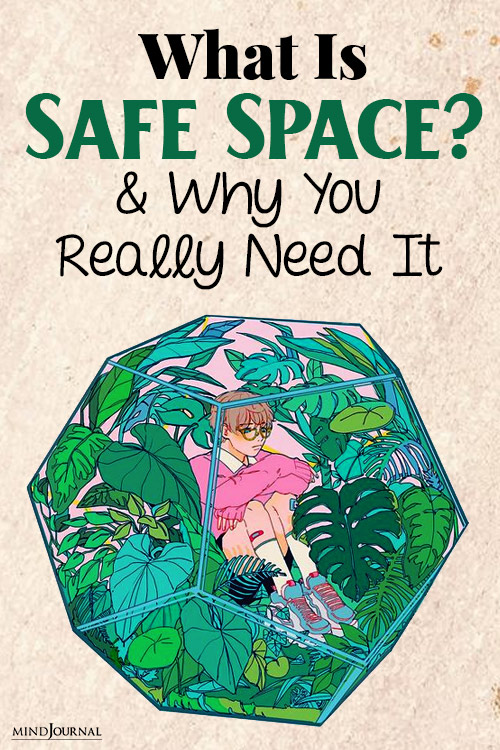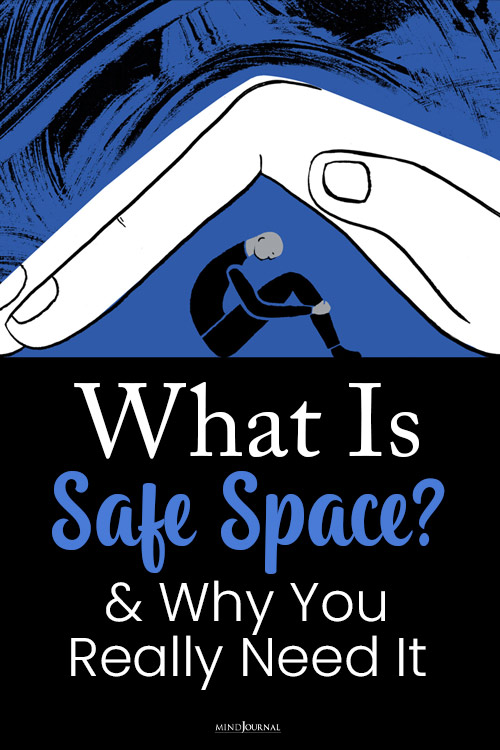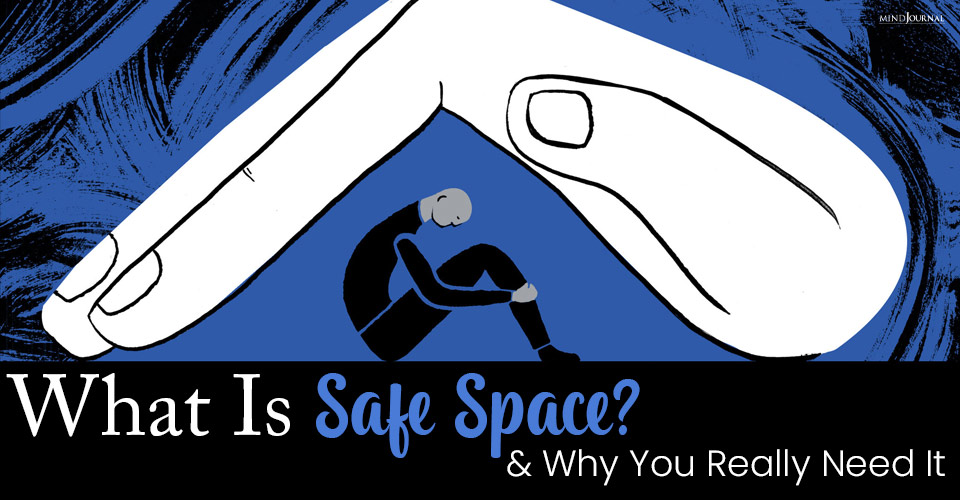Are you feeling beaten down by the incessant blows of life and wondering whether there is a place where you can vent without being judged or attacked? A place that will soothe your soul, nurture you back to your normal self, and make you ready to take on the world again! Such a place can be termed a safe space, an area conducive to sound mental and physical health.
A safe space can be either ideological or physical, it can be a tangible place, created by somebody else, or your own unique headspace, where you can check-in anytime you feel distressed. There are a lot of opinions about the validity and necessity of safe spaces. In this article, we will try to elaborate on the importance of having a safe space in your life and how it can affect your mental health.
What Is A Safe Space?
A safe space generally denotes an area or an environment that offers comfort and support. Such a place is a safe zone where you can feel relaxed and protected from either unpleasant internal thoughts or external persecutions. It should enable you to be your authentic self, help you to cope with the various stresses of life, recharge, rejuvenate, and feel much better than what you were feeling before.
A safe space allows the free exchange of thoughts without the risk of persecution. Such a space exudes inclusion, support, and a feeling of belonging, especially among minorities and historically oppressed groups of people. Therefore, A Safe Space can be:
1. Ideological
It can be your positive headspace that empowers you to have a better disposition of life. It is your unique world that you build and visit, using certain mindfulness techniques.
2. Physical
A building or room dedicated to a specific purpose and group, where community members can assemble without any fear of physical or emotional harm. Your own home and office can have a customized space that will help you to cope with life stressors. Campuses of schools and colleges often have dedicated safe spaces to make students of racial and sexual minorities feel safe and included.
3. Environment
A friendly atmosphere that fosters inclusion and offers support to struggling or marginalized groups. According to research, 12 Step Programs like AA and others dealing with addiction, abuse, etc., have a positive impact on well-being.
Why Do You Need A Safe Space?
We all need a safe haven where we can be ourselves, connect with others or with our own emotions, and feel shielded from all the negativities of the world. There can be numerous reasons and benefits of a safe space; here we will take a look at the most important ones.
1. Support
When we can open up about our troubles in front of a loved one, we get to drop our burdens, feel validated, and also receive helpful tips and ideas. Women and young girls facing sexual abuse and/or domestic violence often find safe spaces as a lifesaver. Individuals who battle addiction, discrimination, stigma, and various mental health issues find safe spaces helpful to connect with fellow survivors and to navigate through life. Students belonging to the LGBTQ community, who have to endure harassment and bullying, get a lot of support from educators and peers in the designated safe spaces in schools and colleges.
2. Relaxation
As we cruise through our high stressed lives every day, sometimes it can become all too overwhelming. We forget our blessings, little joys, and even the reasons that motivate and drive us to utilize our potential. At times like these, we need to find a quiet corner, relax, slow down all the racing thoughts in our minds, and just practice mindfulness. Research also validates the efficacy of relaxation for a sound mind.
Related: How To Relax When You’re Addicted To Being Busy
3. Recuperation
A safe space provides us a time-out; an interval when we can process our emotions, take an inventory of our thoughts and plan strategies for our next battle. The opportunity also allows us to go inward and connect with our true selves, which empowers us to realize our innermost fears, dreams, and thoughts. Whether a safe space is virtual or physical, a much-needed break from our troubles allows us to think clearly and move ahead with a clear vision.
4. Well-Being
A safe space, even an emotional one, can be a key factor to manage your overall well-being. If you can create a positive environment around yourself, it will improve your mood significantly. By getting into regular practices of creating mental safe space, you can manage your emotions better and deal with life challenges effectively and gracefully.
Related: 30 Practices To Boost Your Well Being
How Does A Safe Space Improve Your Mental Health?
It’s evident now that a proper safe space can help us feel better emotionally and empower us to further our life goals. Our emotional energies dictate our mental health, so it goes without saying that having a functional safe space in our lives has a direct impact on our mental health.
1. Peer Support
When we meet others who have been in the same trying situation, be it bullying, racism, addiction, or hate, we feel that we are not alone. This makes us less vulnerable to the onslaughts of distress and makes us face them with an instilled feeling of unity. A safe space facilitates this feeling of camaraderie and capitalizes it to promote a culture of honesty, authenticity, and sharing of resources. According to a published study, ‘’There is an internationally growing trend to adopt PSSs (Peer Support Systems) within addiction and mental health services, and despite the ongoing challenges, large sections of the current literature support the inclusion of peer support workers in the mental health care workforce‘’.
2. Comforting Atmosphere
Life can be cruel at times and getting a friendly atmosphere can prove to be a determining factor for better mental health. If we have a choice or control over our surroundings, we tend to feel comforted, happier, and more relaxed. Photos on mantels, interior walls painted with cheerful hues, are all examples of how our environment affects our emotional well-being. Therefore, if we mindfully create a nook with the specific purpose of lifting our spirits, it will have a positive impact on our mental health. The University of Minnesota Masonic Children’s Hospital Child-Adolescent Mental Health Inpatient Unit found out in their survey that ‘’design features in which patients have choice and control offer greater perceptions of calm during their stay in the unit.’’
3. Validation
When faced with bias and prejudices on a regular basis, a struggling person can find validation and reassurance from a mentor or educator. Life coaches, therapists, trained counselors on campuses, and other experts can provide this much-needed stimulus. This can be extremely useful for people who suffer from mental illnesses such as depression, anxiety, and other intellectual disabilities. When a person feels they are being heard and their pain is not inconceivable, they respond better to suggestions, treatment or interventions, as corroborated by a study.
4. Coping Skills
One can learn helpful tips and self-regulatory practices to manage mental health and other distressing incidents of life, in designated safe spaces. A free exchange of ideas opens up multiple possibilities to counter mental health issues, bullying, racism, domestic violence, and so on. Learning about one’s rights and legal proceedings regarding violence or other atrocities often proves to be significant in many cases. Research done on some disabled war veterans proved that ‘’social support had a significant contribution on the mental health of the participants above and beyond the physical disability and deployment type.’’
How To Create A Safe Space In Your Home & Workplace
We spend a lot of time at our homes and offices, thus it is only natural that we should take care to create a favorable environment where we live and work.
1. Engage your senses
Use things that send you comforting triggers, such as photo frames of your loved ones, beautiful paintings, scented candles, wind chimes, and other similar things at your home. These things will make you feel happier and have a positive effect on your overall mood. Don’t shy away from investing in your emotional well-being.
2. Go Green
Keep one or more potted plants near your workstation. You might not be able to bring a lot of comforting objects to your workplace, but don’t let that deter you from creating a safe space for yourself. Plants not only add fresh oxygen to your lungs, but also have various other health benefits, both physical and psychological, according to research.
3. Keep your spirits high
Motivation can be a key factor while dealing with daily life and psychological issues like anxiety disorder, depression, etc. Use colorful post-its with motivational quotes in your living and working space. You can build a reading zone at your home with autobiographies and self-help books written by notable authors and successful people.
Some Dos And Don’ts To Keep In Mind While Creating Your Safe Space At Home And Work:
DOs:
- Give special attention to the aesthetics of your home’s interior decoration.
- Use soothing hues for drapes and inner walls.
- Schedule meet-ups with your support group members at your home and make them feel comfortable.
- Create an online group with your supporting peers and keep their numbers on speed dial.
- Curve out a time from your everyday schedule for introspection and getting attuned with yourself.
- Walk around the office whenever you get free time and say hi to your colleagues.
DON’Ts:
- Go overboard with the decorations or start cluttering.
- Attend calls or respond to messages from people who are harmful for your mental well-being.
- Have heated arguments or fights in front of your children.
- Discuss religion, politics, or anything triggering with your colleagues.
- Interrupt others when they are giving their opinion on something.
How To Create A Safe Space In Your Mind
There are a few self-regulatory practices that you can apply easily to create a safe space for your mental wellness.
1. Cut-Back your online activities
Limit your online activities and spend more time with your loved ones. It promotes a safe space right in your living space. Not only will your family members appreciate and open up to you, it will also curb Internet Addiction, which has been proved to be the cause of depression and general deterioration of mental health by various studies.
2. Spend more time in nature
Nature can be an abundant source of emotional healing. Curve out time to go for hikes or strolls in the park. Research done on the psychological effects of nature therapy suggests that ‘’nature therapy will play an increasingly important role in preventive medicine in the future’’. A separate study goes on to say that Vit-D from regulated sun exposure can help to manage depression and other mental health conditions.
3. Be Physically Active
Exercise not only improves physical health; it has tremendous effects on our mind as well. According to a study by Harvard TH Chan School of Public Health, daily 1 hour walking or a run for 15 minutes, can bring down the risk of major depression by 26%.
4. Pursue Hobbies
Invest time, energy, and money to develop and pursue hobbies and activities that fuel your creativity and passion. Research shows that ‘’enjoyable leisure activities, taken in the aggregate, are associated with psychosocial and physical measures relevant for health and well-being’’. In simple words, when we engage in leisure activities or hobbies, our emotional health, mood, and mental health improve.
5. Meet Friends
Make time to meet friends regularly and share insights on life, success, failures, and other challenges of life. This social support and exchange of ideas will improve your perception of life and help you to have healthier mental health.
6. Set Healthy Boundaries
Remember to say no to toxic connections and self-degrading habits. Develop self-control and don’t indulge in behaviors or activities that can set back your living standards. Be compassionate but don’t succumb to the manipulative behaviors of others.
Here Are Some More Helpful Tips That You Can Follow:
- Go back in your mind and think about the happy times.
- Count your blessings, not your worries.
- Practice gratitude and give thanks often.
- Cultivate patience and be open to the views of others.
- Practice daily journaling and penning down your thoughts
- Meditate and practice mindful breathing.
- Create a mental happy place with all the things you love.
- Whenever you feel triggered, go there and try to visualize those things in your mind.
A Safe Space Is What A Cocoon Is For A Butterfly
In essence, a safe space is nothing but a place or time in your life that helps you to feel better. It makes you feel valued, grounded, and better equipped to face the hardships of life. It is an environment that imparts knowledge and tools to manage emotions better.










Leave a Reply
You must be logged in to post a comment.